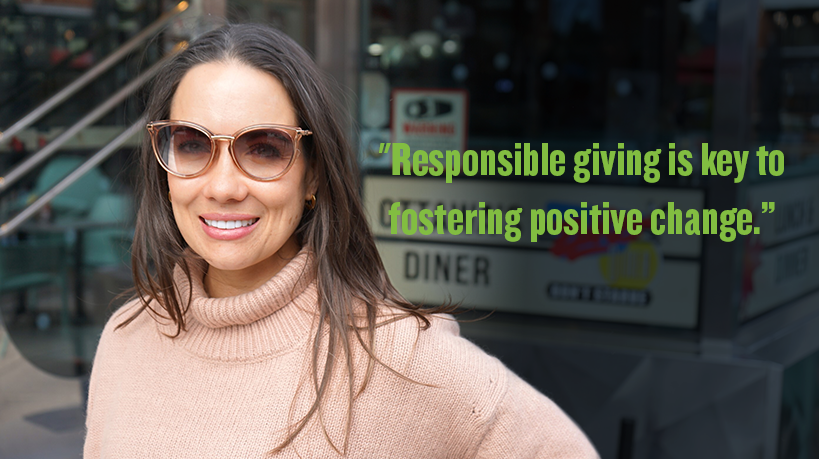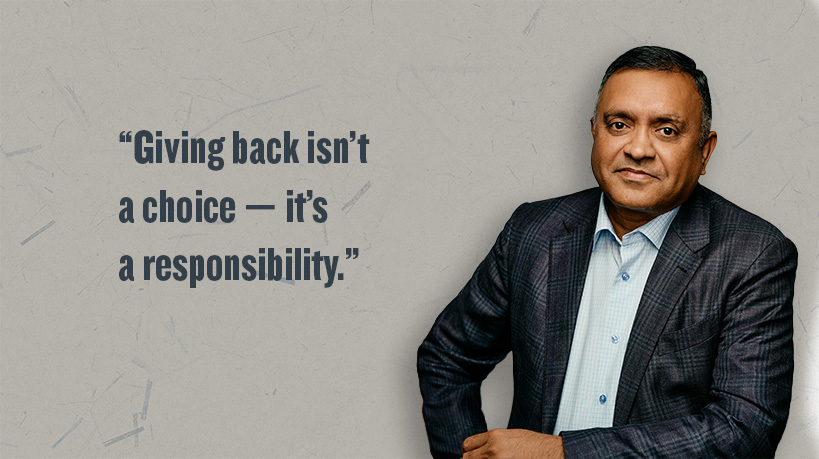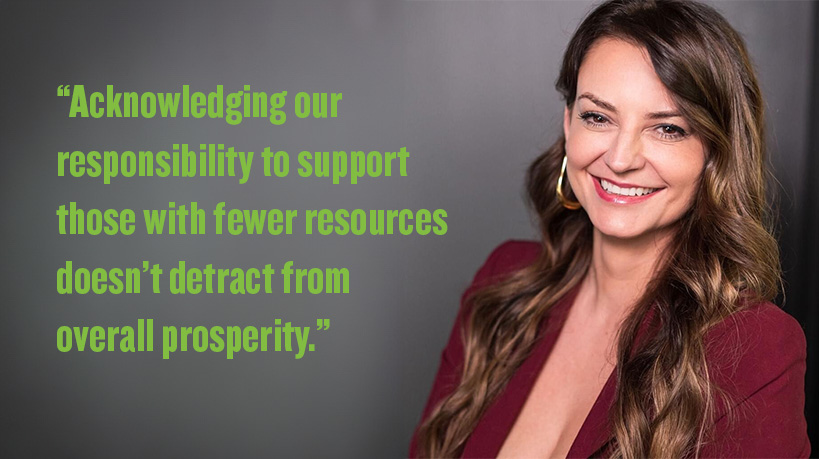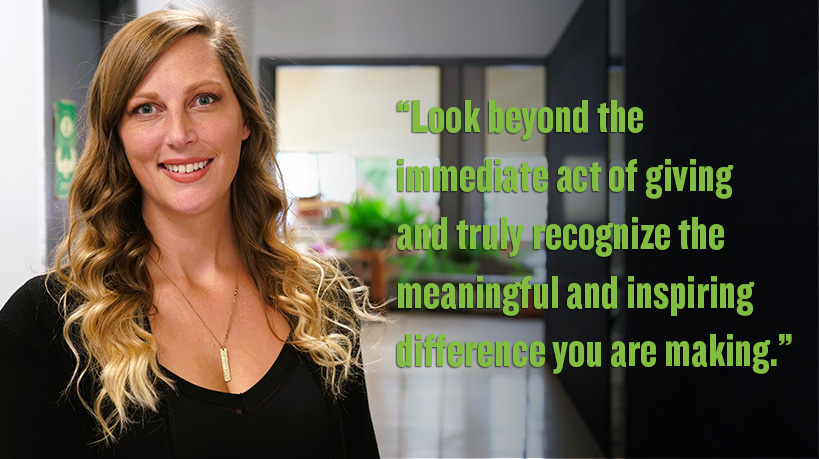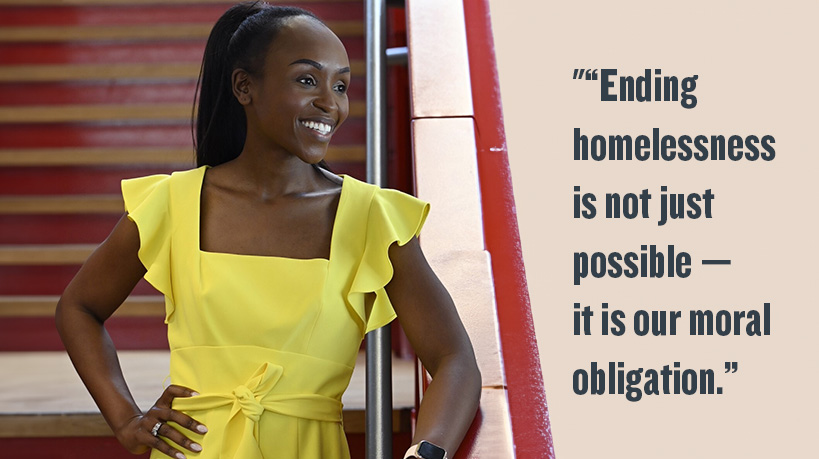Responsible Giving; The Key to Positive Change
Ending Chronic Homelessness in Ottawa is Good Business
Ottawa’s corporate kindness is changing lives. For organizations like Shepherds of Good Hope, this philanthropic spirit allows frontline staff and volunteers to meet people where they are, supporting them throughout the continuum of care.
Business leaders understand why it is essential to support charitable causes in our community. Their connection to meaningful causes and shared purpose brings goodwill and their generosity lifts an entire community – even if it is one person at a time.
Shepherds of Good Hope spent time with five local businesspeople, asking them, straight up; “Why, as a business leader, is it important for you to give back?”.
Shepherds of Good Hope Foundation, CEO, David Gourlay is grateful for the growing relationships between the Foundation and businesses across Ottawa. They are united in a passion to help people in need of shelter, nourishment, and a place to call home.
“Someone experiencing homelessness today must be seen for who they are, without judgement,” says Gourlay. “In Ottawa, we believe that people help people, and we must be there throughout their journey and be ready to help no matter their circumstances. Local business leaders like Ashley, Solange, Nik, Sofia and Devinder turn their words into action, seeing people as people, knowing that homelessness should only be a temporary experience.”
“All of us deserve acceptance and tenderness,” Gourlay says. “The voice of someone experiencing homelessness can get lost among the many needs of a community. However, when businesses consciously decides to make a difference, those voices are amplified. They’re saying, ‘we see you, we hear you, we’re here to help’.”
In Their Words – Why We Give Back.
Sofia Santiso Borsten – Director of Marketing & Advertisement, The Grand Pizzeria & Restaurant Group
In Ottawa, a city celebrated for its rich history and vibrant culture, addressing chronic homelessness is not just a responsibility but a necessity for us all. This is OUR Ottawa, and these are OUR people. Ignoring distressed areas under the assumption they don’t affect us is not only selfish but also shortsighted. Every part of our city is interconnected. When our major tourist destinations or local neighborhoods suffer, the ripple effects are felt throughout Ottawa. Reducing homelessness benefits the broader community by decreasing public health risks and improving the overall quality of life for all residents. We must unite as a community to build resilience and create effective solutions.
As a business leader, giving back to Ottawa is integral to my role. This city has supported our businesses for nearly 40 years, and in turn, it’s our duty to reciprocate. Recognizing the humanity in every person and understanding the complexities of mental health and addiction is crucial. It’s not just about donating money; it’s about maximizing impact and contributing in ways that make a real difference. Institutions with a holistic approach, like Shepherds of Good Hope, are vital in directing resources where they’re most needed, whether for meals, addiction treatments, counseling, or healthcare. Responsible giving is key to fostering positive change.
To the volunteers and donors, your contributions are the backbone of our progress. Your generosity goes beyond mere help; it is transformative. Every moment you invest and every donation you make creates a ripple of hope and change within our community. You inspire others to join this cause, helping us build a more inclusive Ottawa. Thank you for your dedication and tireless efforts. Together, we are building a brighter, more connected city.
Devinder Chaudhary CPA – Owner, AIÄNA Restaurant
Ending chronic homelessness is a daunting challenge, but it is a challenge that we, as a community, must face head-on. The toxic drug crisis, coupled with the residual impact of the pandemic and soaring costs of living, has indeed created a perfect storm. Yet, the solution does not lie in pushing these issues to the margins of society. As a business owner, I believe that private enterprises, in collaboration with government and social organizations, must invest in tackling the root causes—substance abuse, mental health crises, and lack of affordable housing.
The way forward must be rooted in compassion and practicality. We need to treat the homeless as fellow citizens, not as a burden. It’s essential to realize that any one of us, given different circumstances or a few poor choices, could find ourselves in the same situation. We need long-term, sustainable investments in mental health care, rehabilitation, and affordable housing solutions. This is not solely the responsibility of government or charity—it’s a shared responsibility. By doing so, we ensure not only the well-being of the most vulnerable but also the vibrancy and safety of our neighborhoods and businesses.
Giving back isn’t a choice—it’s a responsibility. When I first arrived in Canada with less than $100 in my pocket, I experienced firsthand the opportunities that this country offers. Canada gave me more than I could ever have imagined, and it is now my duty, as a business leader and a member of this community, to pay it forward.
For me, giving back is not just about financial support, it’s about actively contributing to the social fabric that binds us all. In a country as wealthy as Canada, businesses have a unique platform to create positive change. It’s part of our national identity. From providing jobs to supporting local causes, we have the power to uplift those in need. To me, success is not measured solely by the bottom line, but by the impact we make in the lives of others, especially the most vulnerable. This is not charity—it’s an investment in the future of our community, our country, and ultimately, ourselves.
To the volunteers and donors who give so selflessly of their time, resources, and compassion, I would say this: You are the quiet heroes of our community. The work you do, often without recognition, is the lifeline for so many who are struggling. I may not have a personal story of someone close to me being helped by your efforts, but I know that you are changing lives every day. Your compassion, kindness, and generosity gives hope where it is most needed.
I firmly believe that no one chooses to be homeless or to suffer from substance abuse. Circumstances beyond control lead people down these difficult paths. The fact that you choose to be part of the solution—whether through donations or hands-on involvement—is a testament to the strength and generosity that defines our Canadian identity. You are making our community stronger, more humane, and more just. From the bottom of my heart, thank you for your unwavering support and belief in a brighter tomorrow for all.
Ashley Hopkins – President & CEO, Paradigm Commercial
I always find it concerning to hear conversations where homelessness or addiction is explained as a distant issue, something only for ‘others’ or for ‘the powers that be’ to address. Of course, all levels of government have a responsibility to commit to comprehensive, measurable, and well-funded solutions, but this takes time. My question back is always, ‘so, should we just wait?’. I’m not saying we stop advocating for change, far from it. Communities and industry can play a powerful role in identifying gaps in services and ensuring those who need support today aren’t left behind because the current model is broken. Innovation is born out of necessity and private industry moves faster. If we model our expectations and show tangible change, we help those along the way and ensure we never stand still.
Regardless of each of our current circumstances, life is unpredictable; an economic downturn, an injury followed by a challenging recovery, or a mental health crisis can put any of us, or our loved ones, in direct contact with these systems. While there are organizations, like Shepherd’s, working tirelessly every day advocating for both immediate and long-term change, we must recognize that the responsibility to sustain a supportive community is ours, too. By believing it could never affect us, we risk not only the futures of those who need help today but also of those we love in our community.
Yes, our motivation to give back started because of the people we’ve seen benefit from the services, but honestly, I think it’s rooted in the realization of how many others are still waiting for that help. Watching the tangible impact of these services on individuals drives home the importance of making sure they are sustainable. We take for granted the stability we have, food, a roof…even picking up the phone to a friend and getting encouragement when we need it. These are privileges that not everyone enjoys. It is irrelevant if you give your time, connections, or resources; however, it is essential to recognize that we are part of a community that thrives when we contribute rather than just take.
The economy relies on the health of the community it serves. It is an ecosystem and to deny the needs of any part of the community will only serve to stall overall growth. So, as business leaders, acknowledging our responsibility to support those with fewer resources doesn’t detract from overall prosperity. Instead, it strengthens our community by creating an environment where everyone has the chance to contribute and thrive.
Nik Lemieux – Strategic Consultant, CEO, Mirabel Management Inc.
I believe that we need to recognize that individuals without a home impacts entire communities, not just individuals. When people lack stable housing, it affects public health, safety, and even local economies. Collaborations allows us to pool resources effectively, ensuring comprehensive care for those in need.
Collaboration also helps reduce stigma. When we come together, we humanize the issue and foster empathy, which can encourage individuals to seek the help they need without fear of judgement.
I also believe that collective action strengthens our communities. It creates a shared sense of purpose and support, ultimately building stronger, more resilient neighbourhoods. By working together, we can tackle complex challenges of chronic homelessness and move toward a more compassionate approach.
Helping the community is absolutely vital for business leaders, and I can’t stress enough how crucial it is. First and foremost, businesses thrive in the communities they serve. When we invest in local initiatives, we’re not just giving back; we’re actively fostering an environment where everyone can succeed. A healthier, more vibrant community ultimately benefits all of us, including our businesses.
Additionally, being involved in the community allows for connections that can lead to innovative partnerships and new opportunities that help both the business and community flourish. Giving back is not just a nice thing to do, it is essential. It’s all about leadership with purpose, and I believe it’s one of the most important responsibilities we have as business leaders.
People volunteer or donate for a myriad of reasons, yet often they may overlook the profound impact their compassion and empathy have on others. I encourage everyone to look beyond the immediate act of giving and to truly recognize the meaningful and inspiring difference they are making. Embracing this understanding allows them to feel the depth of their contribution, which in turn fosters positive sentiments within their community.
When we connect with the impact of our actions, we not only uplift those we help but also enrich our own lives in return. The sense of making a difference and facilitating change is a powerful experience, and those who support others in this way deserve to feel that reward deeply.
I hope that everyone gets to experience that in their lifetime.
Solange Tuyishime Keita – President and CEO, Elevate International Inc.
One of the biggest problems we face is the belief that homelessness could never happen to us. Even though we see it every day—in the comfort of our homes, cars, and beautiful communities—many believe homelessness is far from their reality. But that narrative is false. Homelessness can happen to anyone, and many are just one or two paychecks away from facing that reality. Worse yet, we never know what unexpected event could affect our mental health or circumstances so deeply that we, too, could end up without a home.
There are harmful stereotypes about homelessness that persist, such as the assumption that it is always linked to personal failure or addiction. While these issues can contribute, homelessness is often the result of systemic failures and challenges beyond individual control. Our society must stop seeing homelessness as someone else’s problem. Instead, we should recognize our shared responsibility to end it.
I can speak to this from personal experience. As a child, I lived in a beautiful, gated home, but when war and genocide erupted, my family became refugees overnight. We went from living comfortably to surviving in a tent in the middle of nowhere. This experience taught me that homelessness is not something that happens to “other people”; it is a reality that can affect anyone at any time.
We must understand that homelessness is not just a lack of shelter—it is the loss of safety, dignity, and hope. It strips people of their identity and worth. Our shared humanity demands that we act, not out of pity, but out of a deep sense of justice. Homelessness isn’t an isolated problem; it’s a mirror reflecting the cracks in our society. If we are to thrive as a community, we must first ensure that no one is left behind in the shadows. Ending homelessness is not just possible—it is our moral obligation.
“Giving back” and “paying it forward” are more than just common phrases—they reflect the core of our responsibility as citizens of this world. As business leaders, it’s essential to recognize that our success is never achieved in isolation. We are deeply interconnected with our communities, and the resources, knowledge, and influence we gain come with the responsibility to uplift others and drive meaningful change.
For me, I’ve come to realize that the gifts I’ve received—whether financial, intellectual, or relational—are not mine to keep. They are entrusted to me because the universe believes I will use them wisely for the benefit of others. My journey has taught me that we are merely stewards of these blessings, and with stewardship comes the duty to ensure that we share our resources wisely and generously.
Business leaders hold immense power to influence not just economies but the very fabric of society. We have the ability to create jobs, mentor future leaders, invest in education, and build systems that foster sustainable growth. More than that, we have the opportunity to create a culture of compassion and responsibility within the business community. By leading with generosity, we set an example that inspires others to do the same.
The impact of giving back extends far beyond individual actions—it creates ripple effects that transform lives, communities, and futures. It’s not about charity for charity’s sake; it’s about recognizing our role in making the world a better place. When we all do our part, the world becomes infinitely better. Giving back is how we honor the blessings we’ve received and build a lasting legacy of kindness, compassion, and progress for generations to come.
Ten years ago, my family’s world was turned upside down when my youngest brother, once a star soccer player on his university team, began experiencing severe mental health challenges. It started with anxiety so intense that he couldn’t even get out of the car to play the game he loved.
Soon, he started disappearing for days, haunted by voices in his head. My brother is the kindest soul you will ever meet and seeing him suffer felt deeply unfair. Watching this unfold was devastating, especially for my parents, who had already endured so much.
After surviving war, genocide, and rebuilding their lives as refugees, I believed they had finally earned peace. But mental illness doesn’t discriminate—it can affect anyone, at any time. During those difficult moments, we entered a new reality, filled with ignorance and misconceptions about mental health.
People suggested my parents kick my brother out, believing tough love would set him straight. But these misunderstandings only deepened our pain. As people of color with accents, my parents faced additional barriers when seeking help, encountering prejudice that compounded their struggle.
To the volunteers and donors who dedicate their time and resources to organizations like Shepherds of Good Hope, I can’t thank you enough. Your commitment to making our system more compassionate is a beacon of hope for families like mine. You support those who cannot advocate for themselves because their mental health no longer allows them to, and you offer relief to families who feel lost and helpless. Your generosity is not just charity—it is a lifeline. It offers dignity, love, and the possibility of recovery. Our society desperately needs more people like you, and more organizations that believe in the potential of every human being.
Together, we can create a future where everyone has the chance to thrive.


